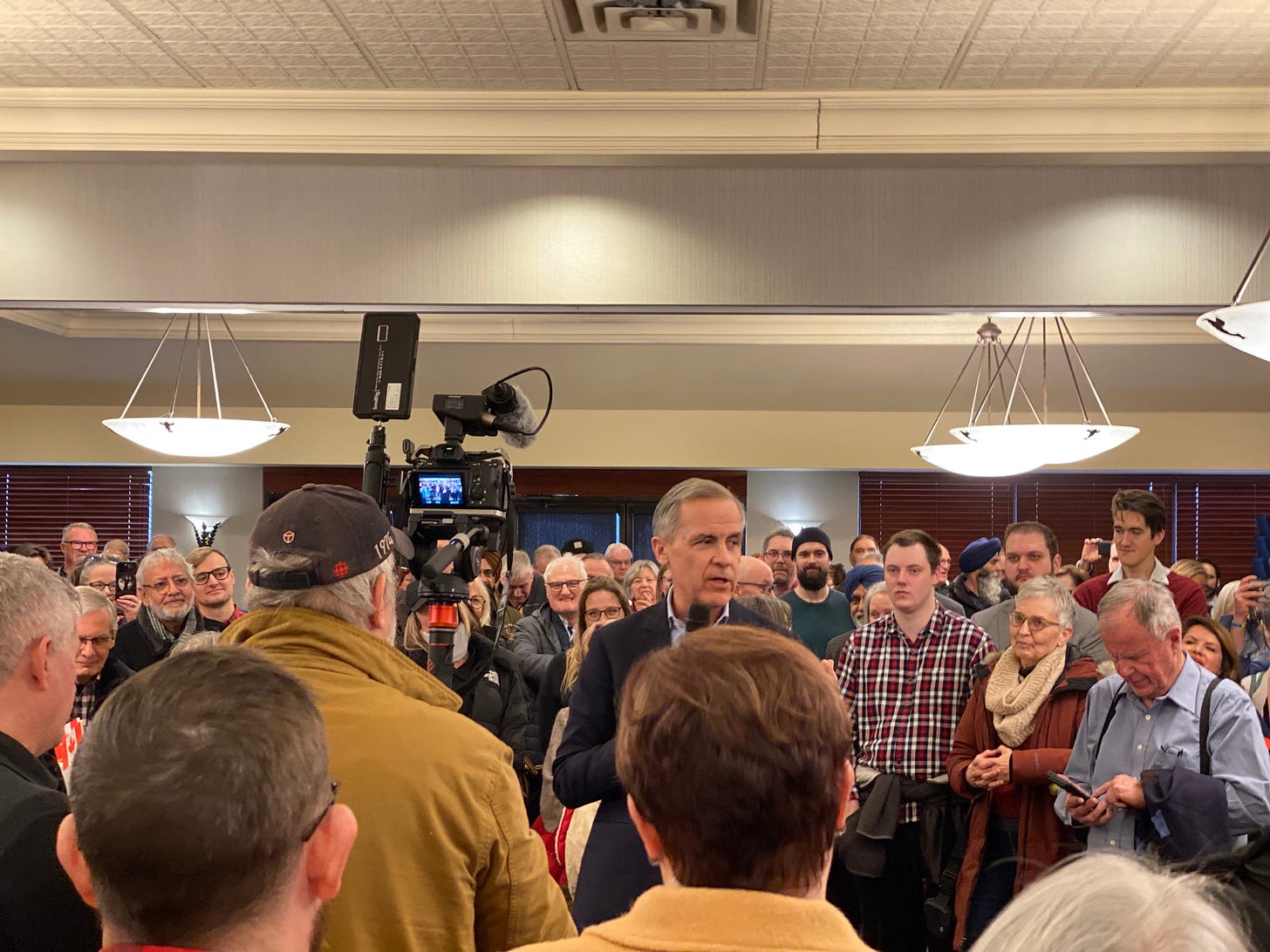Mark Carney’s Vision: A Strong, Independent Canada in an Era of U.S. Threats
My analysis on the speech by the Liberal Party of Canada's frontrunner in the leadership race
When I received an invitation to meet Mark Carney I eagerly pinned my Canadian flag to my jacket and headed over to the Ramada Conference Centre. At a time when Canada's economic and political landscape is being tested by growing U.S. protectionism, tariffs, and even threats of annexation, Canadians are looking for a leader who can navigate these turbulent waters. Enter Mark Carney, former Governor of the Bank of Canada and a globally respected economist, who has emerged as a strong contender in the Liberal Party leadership race. His speech today in Kelowna, BC, painted a hopeful and pragmatic vision for Canada—one that stands in stark contrast to the rhetoric coming from Conservative leader Pierre Poilievre.
A Message of Pragmatism and Positive Change
Carney made it clear from the outset that he is not a career politician, but a pragmatist—someone who has spent his career solving real-world economic challenges. He acknowledged that while policies like the consumer carbon tax were designed with good intentions, they have become divisive. Instead of outright elimination, Carney proposes a refined approach: lifting the burden from consumers and small businesses while ensuring that large corporations shoulder their fair share. This is a striking contrast to Poilievre’s approach, which centers on tax cuts without addressing long-term sustainability or climate concerns.
Carney’s economic plan is built on three pillars: ensuring Canadians keep more of their hard-earned money, fostering economic resilience against external shocks, and accelerating infrastructure development. His promise to balance the budget within three years and deliver a middle-class tax cut demonstrates a commitment to fiscal responsibility without compromising social services.
A Vision for Economic Sovereignty
With the resurgence of Trump-era nationalism in the U.S., including threats to Canadian sovereignty and economic stability, Carney’s emphasis on strengthening Canada’s self-reliance is both timely and necessary. His plan calls for building a robust domestic economy that can weather American volatility. This includes major investments in housing, trade corridors, and energy infrastructure—policies that will not only drive economic growth but also reduce reliance on U.S. markets.
By contrast, Poilievre’s approach—characterized by sweeping budget cuts and deregulation—does little to protect Canada from external economic threats. His vision is reactive rather than proactive, failing to recognize the urgency of securing Canada’s economic future in a world where protectionism is on the rise.
The Rapid Reversal of the Liberal Party in the Polls
Carney’s message is resonating with Canadians. Recent opinion polls show a surge in Liberal support as the country rallies against Trump’s increasingly hostile stance. In times of uncertainty, voters tend to gravitate toward leaders with proven experience and a steady hand. Carney, with his extensive background in global finance, is uniquely equipped to steer Canada through this moment of geopolitical turbulence.
Why Canada Needs an Economist at the Helm
Mark Carney’s resume speaks for itself. As the former Governor of both the Bank of Canada and the Bank of England, he has managed economies through financial crises, ensuring stability in the face of global downturns. His deep understanding of international markets, trade, and fiscal policy makes him an ideal leader for Canada at a time when economic foresight is paramount.
Carney’s ability to craft policies that balance growth, fairness, and sustainability is exactly what Canada needs. He recognizes that a strong economy is the foundation for a strong social safety net—ensuring that essential services like healthcare, pensions, and childcare remain accessible to all Canadians. In his words:
“For, you know, people in this room, your children, grandchildren, we care about that… we care about the vulnerable in society. And we know that we can't redistribute what we don't have. We know we can't be strong abroad if we're weak at home, we know we can't build the future if we can't manage the present. So we care about a strong economy and we're going to build a strong economy.”
A Call for Unity and Action
Carney closed his speech with a powerful reminder: this is our time to act. His vision is one of national unity, economic resilience, and a firm stance against external pressures. As he put it, Canada is not—and will never be—America. His message is one of hope and determination, inspiring Canadians to rally behind a leader who understands the challenges ahead and has the expertise to navigate them.
In contrast, Poilievre’s approach lacks the depth, vision, and strategic foresight needed to secure Canada’s future. At a time when our economic sovereignty is at stake, Canadians must choose between fear-mongering and pragmatic leadership. Mark Carney offers the latter—a hopeful, solutions-driven path forward for the country.
As the Liberal Party gains momentum, Carney’s message is clear: Canada has the opportunity to build a stronger, more self-sufficient future. The question now is whether Canadians are ready to embrace that vision and take a stand against the forces that threaten our economic stability and national identity.
Carney ended his speech with these words “To make the greatest country in the world even better, this is our time. This is our moment. Thank you for your support. Let's build together.” He definitely has my support.
For a video recording of Carney’s speech checkout Castanet’s coverage on YouTube.






